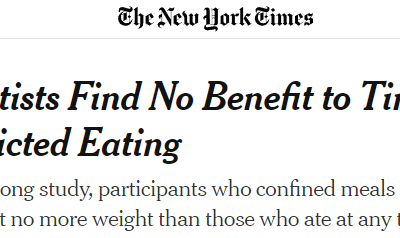The New York Times reported on a study in the New England Journal of Medicine (NEJM) on time restricted eating, or as it is more commonly known these days, intermittent fasting. It’s important to note the study was also based on calorie restriction, which was left out of the headline, in addition to time restriction. The study showed no significant difference in weight loss or body composition between those practicing both calorie restricted and time restricted eating versus those simply practicing calorie restriction.
But now, a rigorous one-year study in which people followed a low-calorie diet between the hours of 8 a.m. and 4 p.m. or consumed the same number of calories anytime during the day has failed to find an effect.
The study, published on Wednesday in the New England Journal of Medicine, was led by researchers at Southern Medical University in Guangzhou, China, and included 139 people with obesity. Women ate 1,200 to 1,500 calories a day, and men consumed 1,500 to 1,800 calories daily. To ensure compliance, participants were required to photograph every bit of food they ate and to keep food diaries.
The bottom line, said Dr. Ethan Weiss, a diet researcher at the University of California, San Francisco: “There is no benefit to eating in a narrow window.”
Scientists Find No Benefit to Time-Restricted Eating – The New York Times (nytimes.com)
The article did not report on what the study participants ate. I don’t have a sufficient background in analyzing the study so I’ve reached out to some doctors on Twitter to see if they will review the findings.
I know from personal experience over decades of eating mainly one meal a day that I never need to restrict calories, count calories, count macros, or limit myself in any way in order to maintain my weight. I also know from personal experience if I want to lose weight I simply start restricting intake of carbohydrates, even more than I do now, and I can drop weight very quickly. If you add real fasting to the weight loss regimen, not eating for at least 3 days, you can enhance the weight loss effect even more. These things have held true to me when I waver off my normal weight range of 165 lbs. to 170 lbs.
If people are eating roughly the same number of calories but those calories are high in carbohydrates I wouldn’t expect for there to be a great difference in weight loss between the groups but I would expect some. In fact there was a small difference. The time restricted group lost around 18 lbs. while the other group lost 14 lbs.
The mean weight loss from baseline at 12 months was −8.0 kg (95% confidence interval [CI], −9.6 to −6.4) in the time-restriction group and −6.3 kg (95% CI, −7.8 to −4.7) in the daily-calorie-restriction group.
Calorie Restriction with or without Time-Restricted Eating in Weight Loss | NEJM
The study says it’s not statistically significant but 4 lbs. is enough to make a difference to me. But, statistics is a different world and maybe 4 lbs. isn’t that big a deal if the participants are morbidly obese.
I’d like to see an opinion from a scientist or doctor that I trust.


Leave a Reply